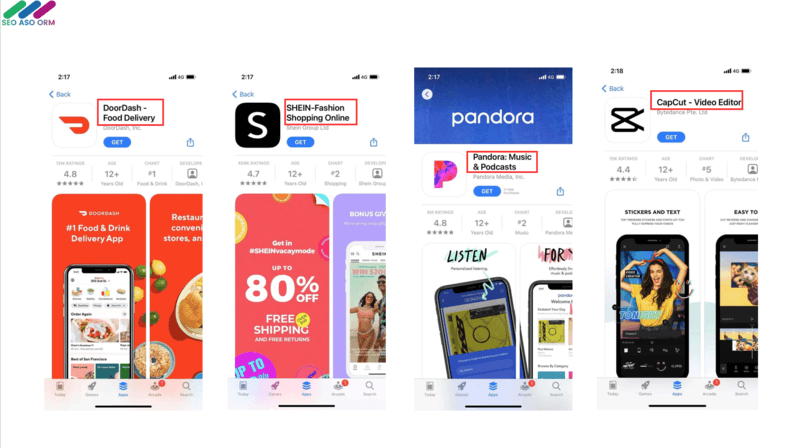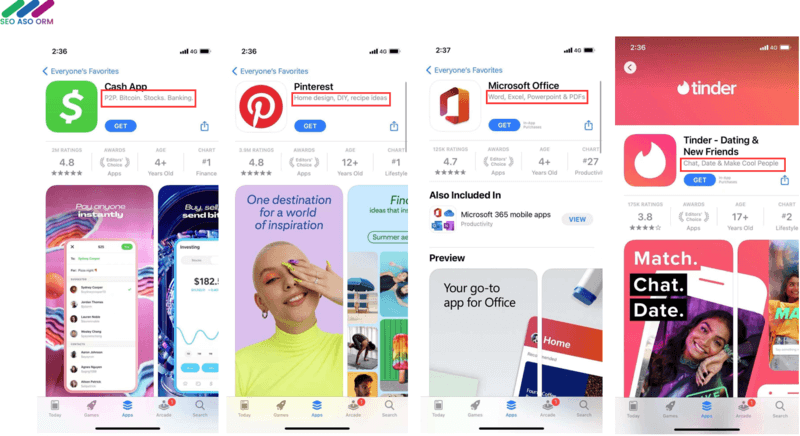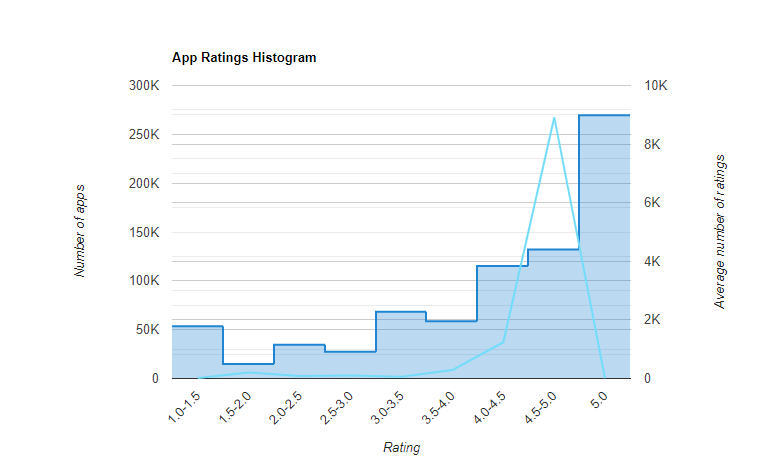App Store Ranking Algorithm for iOS Apps and Games in 2023
Do you know that most of people find your app by browsing and searching the App Store? Therefore, whether your app is listed in App Store or Google Play Store, it is a crucial to rank high.
Then, how to rank high in App Store? App Store ranking algorithm will determine your success in high ranking.
In this post, we will unveil the app store ranking factors and learn how to use App Store Optimization to improve our app rankings and visibility.
Related Post: Google Play Store Optimization: Ranking Algorithm Revealed (2021)
Contents
Top 7 Direct App Store Ranking Factors
In 2019, when Apple was facing international scrutiny for allegedly monopolistic practices with software developers, Apple said that it uses a complex 42-factor system to surface apps during user searches, and deliberately obscures its mechanics to prevent third-party manipulation.
Today, we still don’t know what these 42 factors are, but ASO experts have identified trends and insights into the algorithms that drive search results and downloads.
We all know that app titles, keywords, screenshots, reviews, and downloads, etc., all play a very important role in the App Store ranking.
Now, let’s start to check the 7 most important factors that affect search rankings.
1. App Name
Your app name is one of the most influential factors of keyword rankings. That’s because keywords placed in the App Name have the strongest ranking weight.
The length of your app name can be up to 30 characters on the App Store. One of the best practices for app name is using your brand name along with your most important keywords here.

It has also been seen that using an exact title match for the search keyword produces better rankings. Keep that in mind while creating your app title.
2. Subtitle
Subtitle has the second strongest ranking weight for keyword search ranks.
Subtitle can be used as a complement of the app name in terms of marketing message but also in terms of keywords.
You can also input 30 characters in subtitle field. The best way to optimize your app subtitle is to use very strong and descriptive keywords that will match relevant search queries. Don’t repeat keywords already used in your app name or app keyword field, as they will only be taken into account once.

3. Keywords
Keywords are limited to 100 characters, so it’s important to be concise when describing your app.
Please note that Apple will use single keywords from your app name, subtitle, and keyword field and combine them to make multitudes of combination keywords. Therefore, don’t repeat the keywords you have used in app name and subtitle. You only need to use keywords once across all of these fields for iOS apps.
Here is the full App Store keyword optimization guide for you to optimize your app name, subtitle and keywords wisely.
4. Keyword Installs
If many users search for a specific keyword and then download a specific app from the search results, the algorithm will consider this app extraordinarily relevant to the keyword. As a result, this app will climb up the SERP.
So, you should focus on the relevant keywords of your apps or games to improve the conversion rate.
Note: To make use of this ranking factors, some developer will buy search traffic. They ask many “fake” user search for a specific keywords and then download a specific app from the search results to improve the search rankings. This is a black hat ASO technique.
5. Developer Name
Developer Name is another important on-metadata factor that has an effect on search rankings. For example, when I search “Facebook”, other apps from the same developer will be shown in high position of the search results. The same, when I search “Microsoft Word”, the search results also show me the “Microsoft Office”, “Microsoft Excel” and “Microsoft PowerPoint” in high positions, instead of similar apps to “Microsoft Word”.
So, you’d better add your new app to the developer account that already have famous apps. Then, when people search other apps in the same account, your new apps will be shown in the result. This will drive more downloads to your new app.
6. Reviews & Ratings
According to Apple,
“Ratings and reviews influence how your app ranks in search and can encourage users to engage with your app from search results, so focus on providing a great app experience that motivates users to leave positive reviews.”
Currently, 773,705 (43%) apps have been rated by users while 1,006,646 (57%) have not yet been rated. Most of app have a rating higher than 4-star. For those app have a 5-star rating, the average number of ratings per app is 4. Apps that rated between 4.5-star to 5-start have most ratings and the average number of ratings per app is 8,913.
To make others users convinced, a good rating is not enough. Your app should have a number of good reviews and ratings from users.

Therefore, it is important to encourage your users to rate and review your app. The SKStoreReviewController API lets you give users an easy way to provide feedback about your app. With the API, you can prompt for ratings up to three times in a 365-day period. Make the request when users are most likely to feel satisfaction with your app, such as when they’ve completed an action, level, or task. In this way, you can get more reviews and good ratings.
7. Downloads & Retention (Uninstalls)
This is the one of the key ranking factors that’s not fully under your control as a developer or ASO marketer. As an ASO marketer, it’s almost impossible to organically control your app’s total downloads and uninstalls. In this case, you should work closely with the user acquisition team and the whole marketing team.
If more people are downloading your app, this will significantly improve your ranking.
Therefore, if your app has huge volume of downloads, you can try to rank those keywords which have high volume but competitive. If you have a good marketing strategy and promote your app effectively, you can even increase your downloads consistently and grow organically further from the better rankings.
In contrast, if your app only has a few hundreds of downloads every day, you’d betel focus on the keywords which are less competitive.
Downloads will also affect your app’s or game’s ranking in top charts.
Indirect App Store Ranking Factors
1. App Store Listing Visuals
First impressions matter, especially in the app store. If someone is on the hunt for an app in a competitive space, then your app’s logo, videos and screenshots will influence what they choose to download.
More downloads will improve your search rankings. So, try to create something unique and eye-catching visual assets.
These articles may help you design attractive logos, videos and screenshots.
- How to Create Great App Preview Videos for iOS Apps
- 7 Best App Store Screenshot Generator for ASO in 2021
- 2021 App Store and Google Play Screenshot Design Guidelines
2. Descriptions
Apple App Store does not index keywords in the app description. However, this does not mean this field is not important.
App description is a good place for you to introduce more about your app the users. You can use this space to entice users to download your app and even leave ratings and reviews.
3. Promo Text
Promo Text is a 170-character section on an app’s App Store page that appears at the top of the description for the app and in the product page view.
The same with descriptions, Promotional Text is not indexed for organic keywords by Apple. However, it is still a useful space for ASO. The ability to update it at any time makes it a convenient way to provide news and updates to users at a moment’s notice, remain current with events and offers or provide information about new features.
4. In-App Purchase
Your in-app purchases appear in search results on the App Store. When users tap on them, they’re taken directly to your product page.
Display of in-app purchases in search results can provide more links for passing to the app page, and more opportunities for app installs directly from search listing.
5. Updates
You can build a trail of loyal users from your app updates. That is if the they contain bug fixes and new features that users may have requested. The frequent updates reflect your commitment to meet user needs.
Overall, the satisfaction and loyalty of your current users directly reflect on their engagement with your app and brand. Furthermore, happy users attract more new users to your app. This is another marketing advantage.
Wrapping Up
Focus on the 7 direct ranking factors and 5 indirect ranking factors, you should benefit from a ranking boost in the App Store.
Also, you may have found that many of these factors are strongly linked. For example,
- Picking relevant keywords brings targeted traffic who are more likely to like your app and leave positive ratings.
- High ratings will improve the conversion rate from searches to downloads.
All in all, it is important to make sure that you have a great app in the first place. This naturally leads to good ratings, reviews and new users.
